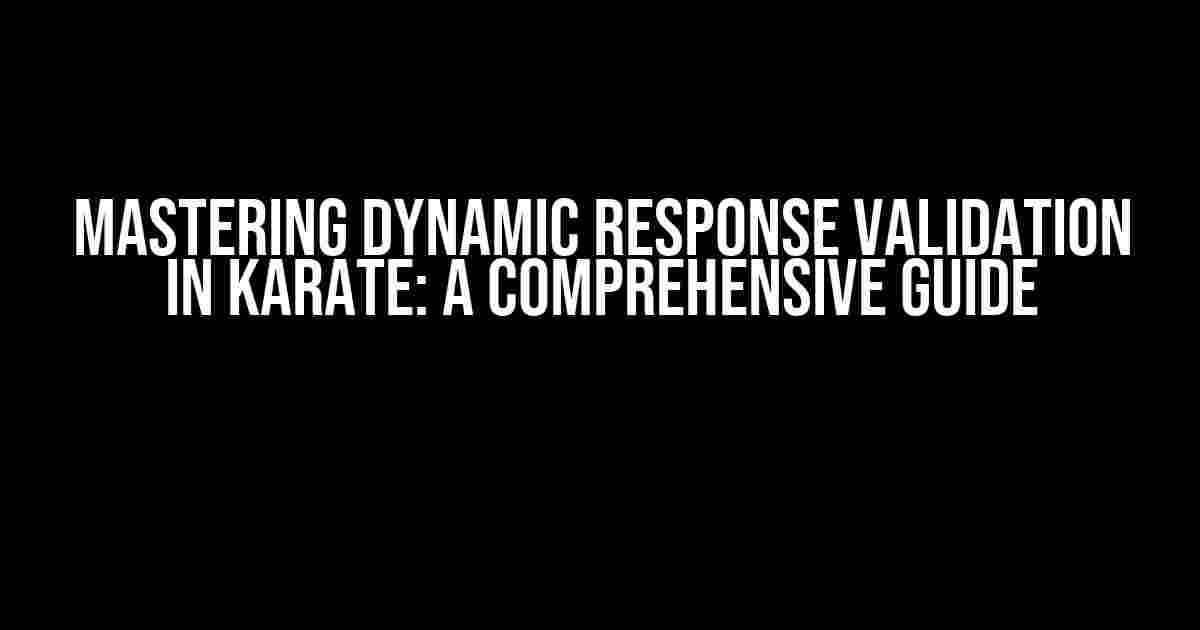Are you tired of writing tedious and fragile test scripts in Karate? Do you struggle to validate dynamic responses with ease? Worry no more! In this article, we’ll dive into the world of dynamic response validation in Karate, and explore the best practices to make your testing journey smoother and more efficient.
What is Dynamic Response Validation?
In Karate, dynamic response validation refers to the process of verifying the accuracy and consistency of API responses that change dynamically based on various factors, such as user input, database interactions, or environmental variables. This type of validation is crucial to ensure the reliability and robustness of your API tests.
Challenges of Dynamic Response Validation
So, what makes dynamic response validation so challenging? Here are some common obstacles you might encounter:
- Unpredictable Response Structures: API responses can have varying structures, making it difficult to write static validation scripts.
- Dynamic Data Types: Responses may contain dynamic data types, such as arrays or objects, which can be tricky to validate.
- Environmental Dependencies: API responses can depend on environmental factors, like database connections or third-party integrations, which can affect test results.
Karate’s Dynamic Response Validation Capabilities
Luckily, Karate provides several features to tackle dynamic response validation with ease. Let’s explore these capabilities:
1. JSONPath Expressions
Karate allows you to use JSONPath expressions to extract specific data from API responses. This feature is particularly useful for validating dynamic data.
* def response = { "data": { "user": { "name": "John", "age": 30 } } }
* def jsonPath = "$.data.user.name"
* match response == { data: { user: { name: 'John' } } }
* match response(jsonPath) == 'John'
2. Fuzzy Matching
Karate’s fuzzy matching capability enables you to validate responses with varying structures or dynamic data types.
* def response = { "data": [ { "id": 1, "name": "John" }, { "id": 2, "name": "Jane" } ] }
* match response == { data: [#(1..2)] }
3. JavaScript Functions
Karate allows you to write custom JavaScript functions to validate complex responses. This feature provides ultimate flexibility in dynamic response validation.
* def isValidResponse = function(response) {
return response.data.length > 0 && response.data.every(item => item.id > 0)
}
* match isValidResponse(response) == true
Best Practices for Dynamic Response Validation in Karate
To get the most out of Karate’s dynamic response validation capabilities, follow these best practices:
- Use JSONPath Expressions Wisely: JSONPath expressions can be powerful, but they can also make your tests brittle. Use them judiciously to extract specific data.
- Keep Fuzzy Matching in Check: Fuzzy matching can be useful, but it can also lead to false positives. Use it sparingly and with clear expectations.
- Write Custom JavaScript Functions with Care: Custom JavaScript functions provide ultimate flexibility, but they can also make your tests harder to maintain. Keep them concise and well-documented.
- Test for Expected Failures: Don’t just test for success scenarios. Validate that your tests fail correctly when responses are invalid or malformed.
- Use Data-Driven Testing: Data-driven testing allows you to test multiple scenarios with ease. Use this approach to validate dynamic responses with varying inputs.
Real-World Examples of Dynamic Response Validation
Let’s explore some real-world examples of dynamic response validation in Karate:
Example 1: Validating Dynamic User Data
| Response | Validation Script |
|---|---|
|
|
|
|
Example 2: Validating Dynamic Product Pricing
| Response | Validation Script |
|---|---|
|
|
|
|
Conclusion
Remember, the key to successful dynamic response validation is to be flexible, adaptable, and creative in your testing approach. Don’t be afraid to experiment and try new things – and always keep your tests lean, mean, and validation machines!
Frequently Asked Questions
Get ready to master dynamic response validation in Karate with these frequently asked questions!
What is dynamic response validation in Karate, and why do I need it?
Dynamic response validation in Karate is the process of verifying that the response from a request matches the expected outcome. You need it because it ensures that your API testing is robust, reliable, and scalable. Without it, you’d be stuck with tedious manual testing or brittle tests that break easily. Trust us, you want to level up your testing game with dynamic response validation!
How do I get started with dynamic response validation in Karate?
Getting started is easy! First, make sure you have Karate installed. Then, create a feature file with a valid scenario, and use the `match` keyword to define your expected response. Finally, run your test and watch Karate do its magic! If you’re new to Karate, our documentation is a great resource to help you get started.
Can I use dynamic response validation with JSON responses in Karate?
Absolutely! Karate loves JSON, and dynamic response validation works beautifully with JSON responses. You can use JSONPath, XPath, or even JavaScript functions to validate your responses. This means you can get really specific about what you expect in your response, making your tests more accurate and reliable.
How do I handle errors and edge cases in dynamic response validation with Karate?
Error handling is crucial in API testing! With Karate, you can use the `match` keyword with an `error` keyword to specify what to expect when an error occurs. For edge cases, you can create multiple scenarios to cover different possibilities. Don’t worry, Karate’s got your back – our documentation provides plenty of examples to help you master error handling and edge cases.
Are there any best practices for writing effective dynamic response validation in Karate?
You bet there are! Keep your validation concise and focused on the critical parts of the response. Use descriptive variable names and comments to make your tests easy to understand. Also, make sure to test for both happy paths and error scenarios to ensure your API is rock-solid. Lastly, take advantage of Karate’s built-in features, like table-driven testing, to make your tests more efficient and scalable.
